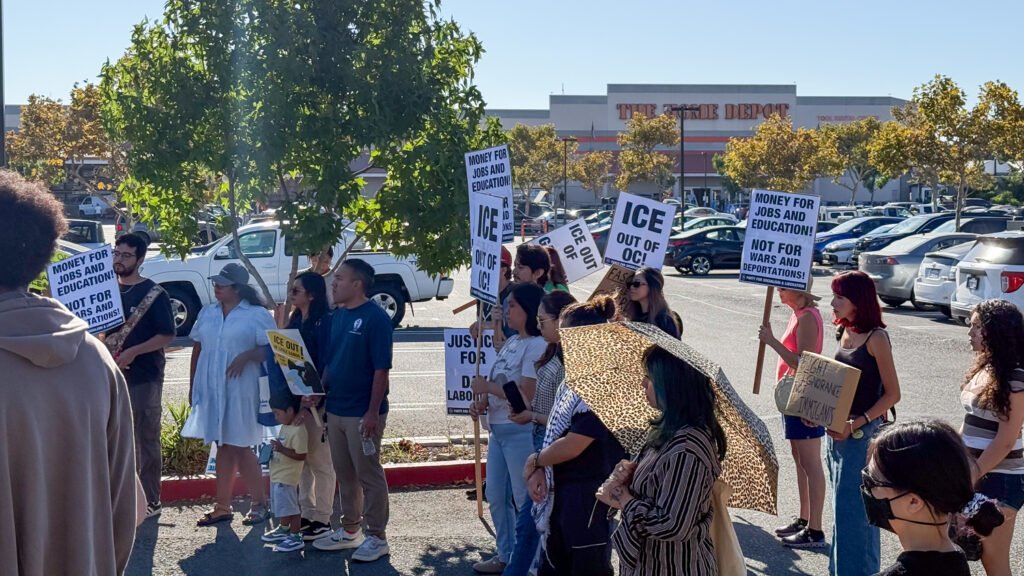In the heart of Garden Grove, a city deeply intertwined with the immigrant tapestry of Little Saigon, anxious voices rise in unison against the backdrop of an unsettling reality. Residents, many of whom are from immigrant families, have reported frightening encounters with federal immigration agents since the unexpected escalation of deportation sweeps in Orange County last June. A palpable tension hangs in the air, with families harboring fears about simply leaving their homes or sending their children to school.
Garden Grove’s Response to Rising Deportation Sweeps
The City Council’s Dilemma
As the night’s city council meeting approaches, Mayor Stephanie Klopfenstein and Councilwoman Ariana Arestegui brace for what they anticipate will be a heated discussion. The agenda includes a resolution reaffirming that local police do not engage in federal immigration enforcement, yet it falls short of outright condemning the immigration raids which have wreaked havoc on countless lives.
Arestegui, a lifelong member of this community, emphasizes the need for the resolution as a critical acknowledgment of the widespread anxiety afflicting her constituents. “These raids have impacted East Garden Grove in particular,” she reiterated, underscoring her deep personal stakes in the matter. “It really pains me to see the anxiety that my neighbors and my family members have.”
Community Reactions
The community’s response has been nothing short of urgent. Numerous residents have filled council meetings, demanding a firmer stance against the immigrant sweeps. Such gatherings have ignited impassioned testimonies highlighting the devastating ripple effects of the raids on families, local businesses, and schools. As one resident expressed, “Your silence is complicity. You are fine with what’s going on, and if that is not true, prove us wrong.”
This shared fear has not only disrupted lives but has also paralyzed the city’s dynamic. Numerous local businesses report pedestrian traffic dwindling as families remain indoors. Schools have introduced “Know Your Rights” seminars, and district officials encourage families to build emergency plans in response to the societal unrest.
The Legal and Social Context
- Over 49% of Garden Grove’s population is foreign-born, with many feeling targeted by these sweeps.
- Reports detail instances where parents—U.S. citizens—were wrongfully detained near schools, resulting in lockdowns and increased counselor presence.
- Neighboring cities like Santa Ana and Anaheim are taking stronger positions by allocating funds for legal defense against ICE raids.
Local officials express ambivalence. Councilman Joe DoVinh remarked, “If we do not comply with federal mandates, we risk losing crucial funding and may face legal repercussions.” Such statements reveal a struggle between local governance and federal law, with the specter of deportation casting a long shadow over the city.
Emotions Run High
A recent public comment from Jennifer Lopez, a member of the OC Rapid Response Network, encapsulated the emotions bubbling under the surface. “Our community leaders should take note of the district’s leadership,” she declared, critiquing city officials for their inaction. Her remarks resonated strongly, igniting calls for stronger community engagement and leadership.
Experts emphasize that the psychological toll of these sweeps can have long-lasting effects. Dr. Linda Chen, a psychologist specializing in immigrant trauma, notes, “Chronic fear in a community can exacerbate issues like anxiety and depression, hindering not just individual well-being but also the social fabric of the community.” Studies have shown that populations facing such anxiety often do not fully engage in societal functions like voting or community service, which can further disenfranchise them.
A Call for Action
As city officials consider the resolution that has sparked both hope and skepticism among constituents, they face mounting pressure to act decisively. Arestegui hopes this small step will foster trust within the community. “At the end of the day,” she said, “any action taken will require the approval of my colleagues. If they don’t support it, we are limited in what we can do.”
This balancing act continues as neighboring cities take aggressive stances against ICE. Santa Ana has committed $250,000 to support immigrant families facing the brunt of potential deportations. Garden Grove council members are beginning to feel the weight of responsibility, and while their cautious approach allows for legal boundaries, residents increasingly demand firmer, proactive strategies.
In this evolving narrative, Garden Grove stands at a crossroads, revealing broader themes of community, identity, and the relentless search for safety amid turbulent waters. As families grapple with their uncertain futures, the actions taken—or not taken—by local officials will shape the landscape of immigrant life in Southern California for years to come.





